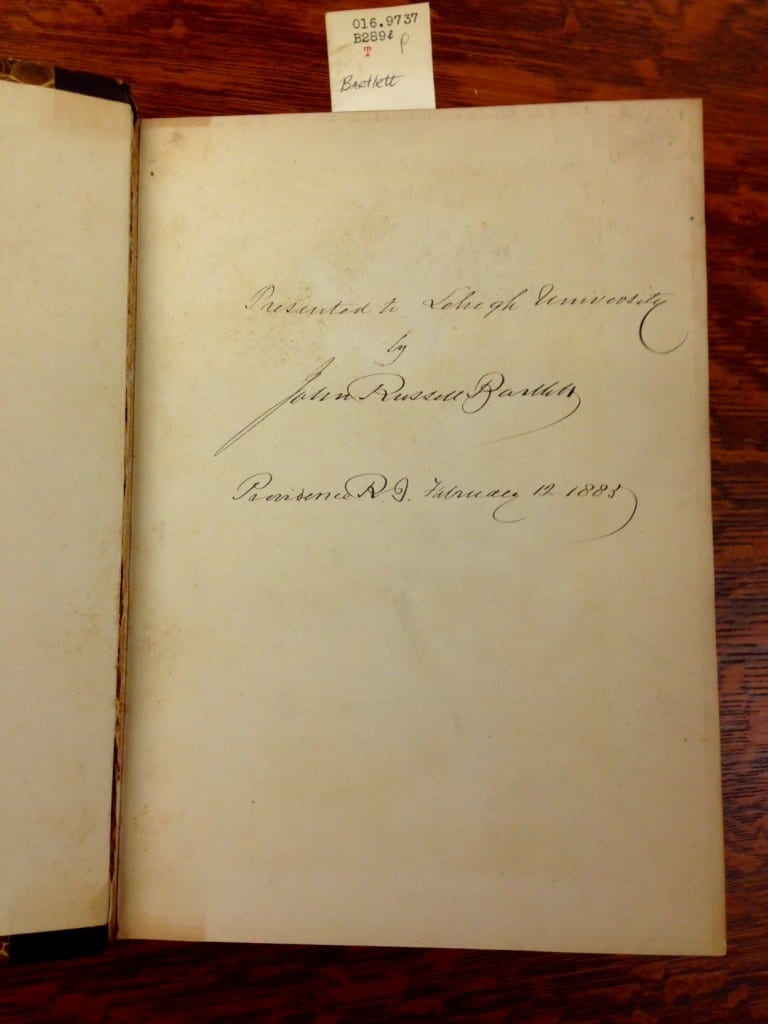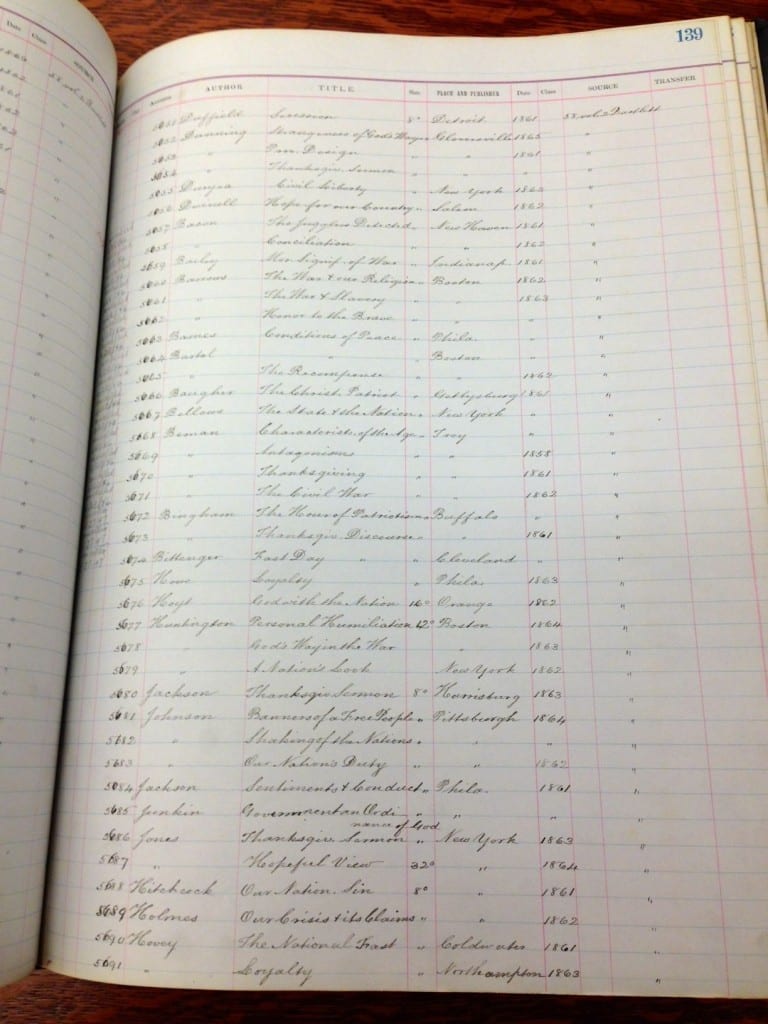The Surprising History of Lehigh’s Earliest Civil War Collection

2015 marks the end of the 150th anniversary of the American Civil War. Like many academic libraries, Lehigh’s Special Collections has a large collection of materials that were written and published during the Civil War. The bulk of our collection, however, comes from one man: Rhode Island writer, publisher, and politician John Russell Bartlett (1805-1886). Who was Bartlett and how did his Civil War collection come to Lehigh? Read on to find out.
Although Lehigh was founded in 1865, Linderman Library was not established until 1878. The first university librarian, Professor of Chemistry William H. Chandler (known as “Billie”), was responsible for building the library’s collections.[1] And, thanks to the generosity of Lehigh’s founder, Asa Packer, Chandler had plenty of money to do so.[2] Although it may seem strange that a chemist was picked to oversee the library, Chandler was by all accounts a polymath and an ardent book-lover. He even compiled his own general encyclopedia (Chandler’s Encyclopedia: An Epitome of Universal Knowledge, 1898). Chandler was known to scour catalogs from dealers across the United States and Europe looking for valuable books that would help Lehigh become a world-class library.[3] Competing with Harvard, Yale, and other more established libraries, Chandler successfully purchased a number of important rare book collections during the first fifteen years of the library’s existence.[4] One of these collections came from the personal library of John Russell Bartlett.
Born in Providence, Rhode Island in 1805, Bartlett was a man of many talents and interests. He began his career as a banker, but before long, his love of books and reading took him in a different direction. In the mid-1830s, Bartlett moved to New York, where he entered into the book business. He and his partner, Charles Welford, opened the bookstore and publishing firm Bartlett & Welford in 1840. After the Mexican-American War, however, Bartlett was appointed to head up the Mexican Boundary Commission. When he returned to the United States, Bartlett became the Secretary of State of Rhode Island, a position which he held until 1872. Over the course of his life, Bartlett wrote a number of books, including A Dictionary of Americanisms (1848) and A Personal Narrative of Explorations and Incidents in Texas (1854) and Memoirs of Rhode Island Officers (1867).[5]
At the start of the Civil War, Bartlett began collecting books, pamphlets, broadsides, and anything else he could find related to the conflict. He was not alone. A number of individuals, including Benson J. Lossing and John A. McAllister, were also early collectors of the Civil War.[6] Unlike his fellow antiquarians, however, Bartlett’s collection was, in the words of one contemporary, “a working library.”[7] His purpose in collecting was to compile a bibliography that would aid future historians of the conflict. To ensure that the bibliography was comprehensive, Bartlett placed notices in major newspapers asking Americans to support his efforts by sending him relevant publications.[8] He also personally wrote to authors asking for copies of their work. Many individuals responded to Bartlett’s requests. In fact, we found several such letters tucked inside the pamphlets Bartlett sold to Lehigh. These items have been digitized, and are now available online through our I Remain website. In the end, Bartlett’s hard work paid off. When Literature of the Rebellion was finally published in 1866, it contained over 6,000 entries.
Even after his bibliography was finished, Bartlett continued to collect material related to the conflict. By the 1870s, Bartlett’s Civil War collection was well known. One writer remarked in 1875, “The materials which it preserves, necessary to a just and proper writing of the history of the great rebellion, are such as could not possibly be duplicated…Its loss by fire or other means, would be irreparable.”[9] On examining Bartlett’s collection a few years later, writer Horatio Rogers proclaimed it to be one of the largest of its kind in the country.[10]

Unfortunately, because of financial difficulties, Bartlett was forced to sell his Civil War collection.[11] In 1872, he offered 3,000 books and pamphlets to the Union League Club for $10,000. They declined.[12] In 1882, he approached Cornell University with the collection. They also declined, saying that they did not have the money.[13] We do not know if Bartlett approached Lehigh, or if Chandler took the lead and contacted Bartlett. But in 1885, Chandler officially purchased the collection. Lehigh received about 6,000 books, pamphlets, and broadsides, as well as a small manuscript collection related to the establishment of Gettysburg Cemetery in Pennsylvania (of which Bartlett played an important role).[14]
Today, Lehigh still has most of this collection, and it is not uncommon to find a book in the stacks with Bartlett’s name in it. The books and pamphlets are wonderful primary sources for those researching the Civil War. But they also have much to offer scholars interested in the history of reading and collecting. Bartlett took notes in a number of the texts, even sometimes recording where he had purchased the item. One of the books from Bartlett’s library that is now owned by Lehigh is Walter S. Newhall: A Memoir by Sara Butler Wrister. The book was published in Philadelphia in 1864. Inside the book, Bartlett wrote his name and a brief note explaining that he bought the book at the Metropolitan Fair in New York, at the table of Mrs. George McClellan on Saturday, April 9th, 1864. Other books were inscribed by the people who gave them to Bartlett. Reverend Augustus Woodbury inscribed his book, Major General Ambrose E. Burnside and the Ninth Army Corps (Providence: Sidney S. Rider & Brother, 1867) to Bartlett in March of 1867. These are just two examples of a rich and unique collection that deserves to be studied more thoroughly.
[1] R. D. Billinger, “The Chandler Influence in American Chemistry,” Journal of Chemical Education (June 1939), 253-257.
[2] M.E. Evans, “Lehigh University Library, Bethlehem, Pennsylvania,” The Library Association Record 61:4 (April 1959), 90.
[3] Robert Metcalf Smith and Howard Seavoy Leach, The Shakespeare Folios and the Forgeries of Shakespeare’s Handwriting (Bethlehem, PA: 1927), 7-8.
[4] New York Times, April 3, 1883; December 18, 1887; February 28, 1890.
[5] John Russell Bartlett, The Autobiography of John Russell Bartlett, 1805-1886 (Providence, RI: John Carter Brown Library, 2006).
[6] Sandra Markham, “John McAllister Collects the Civil War,” The Magazine Antiques 170:2 (August 2006), 102-107. McAllister’s Civil War collection is now owned by the Historical Society of Pennsylvania.
[7] Horatio Rogers, The Private Libraries of Providence (Providence: Sidney S. Rider, 1878), 135.
[8] See, for example: Boston Daily Advertiser, May 9, 1865.
[9] Samuel L. Boardman, “A Valuable Collection,” Potter’s American Monthly 4:40 (April 1875), 270.
[10] Rogers, 142.
[11] John Duncan Haskell Jr., “John Russell Bartlett (1805-1886): Bookman,” Ph.D. dissertation, The George Washington University, 1977, 288-289.
[12] Haskell, 263.
[13] Haskell, 266.
[14] “Fifth Annual Report of the Library Committee to the Board of Trustees of the Lehigh University (For the Year Ending May 31, 1885),” Lehigh University Board of Trustees Meeting Minutes 1 (June 18, 1885), 564. The remainder of Bartlett’s library is at the Rhode Island Historical Society. His papers are split between the Rhode Island Historical Society and the John Carter Brown Library.